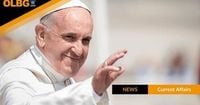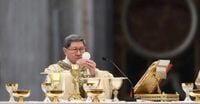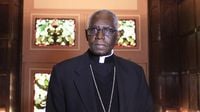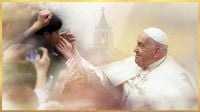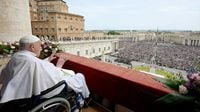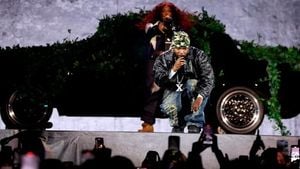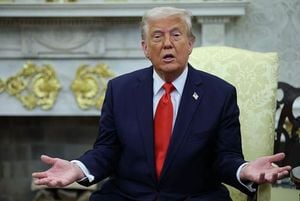Pope Francis, the 266th pope, left a significant mark on the Catholic Church during his 12-year papacy, which ended with his death on Easter Monday, April 21, 2025, at the age of 88. His passing has sparked widespread speculation about who will succeed him as the next Supreme Pontiff, with many eyes on the upcoming papal conclave in Rome.
Francis, who became the first Latin American pope when elected in 2013, was known for his progressive and inclusive approach, which resonated with many young Catholics. His reforms symbolized a modern Church, diverging from the traditional stances of his predecessors. Despite his age, he maintained a high approval rating among the faithful, peaking at 90% in 2015 and standing at 78% near the end of his papacy.
As the world mourns the loss of Francis, the focus turns to potential successors, with various names emerging as frontrunners. Luis Antonio Tagle, the former Archbishop of Manila, is currently leading the betting markets. Tagle, who is regarded as one of the more liberal candidates, has been vocal about the need for the Church to adopt a more compassionate stance towards marginalized groups. His appeal lies not only in his progressive views but also in the fact that he would be the first Asian pope, a significant milestone given the rapid growth of Catholicism in Asia.
Another notable contender is Cardinal Pietro Parolin, who has served as the Vatican’s Secretary of State since 2013. Parolin represents continuity with Francis's policies but has faced criticism for his handling of relations with China. His diplomatic experience and moderate stance make him a strong candidate, with odds currently favoring him at +350, which translates to a 22% implied probability of being elected.
Cardinal Mark Ouellet, who has been a key figure in the Church and served as the Archbishop of Quebec, is also in the mix. However, his age—turning 80 in June—may hinder his chances, as only cardinals under 80 can vote in the conclave. Other candidates include Cardinal Fridolin Ambongo Besungu from the Democratic Republic of the Congo, who could become the first black pope, and Cardinal Robert Sarah, a conservative voice in the Church.
The conclave, which is expected to convene in the coming weeks, will see 120 out of the 138 cardinals eligible to vote. The process requires a two-thirds majority, meaning that the winning candidate must secure at least 80 votes. The outcome remains uncertain, as the dynamics within the College of Cardinals have shifted significantly under Francis's leadership.
Francis's legacy includes a notable diversification of the College of Cardinals, with a significant number of appointments coming from regions outside Europe. This shift reflects the growing global nature of the Church, particularly as the number of Catholics in Africa and the Americas has risen sharply during his papacy. In contrast, Europe has seen a decline in its Catholic population, losing about 1.5 million Catholics between 2013 and 2022.
As the Church prepares for this pivotal moment, many are reflecting on the direction Francis took the Church, particularly in embracing social justice issues, addressing climate change, and advocating for peace in conflict zones. His progressive stance has garnered both admiration and criticism, leaving a complex legacy that his successor will have to navigate.
The selection of a new pope will not only determine the future direction of the Catholic Church but also signal how it intends to engage with contemporary issues facing the global community. The choice of papal name will also be significant, as it often reflects the values and priorities of the new pontiff.
In the wake of Francis's passing, the world watches closely to see who will emerge as the next leader of the Catholic Church and what changes they may bring. With a diverse array of candidates, the conclave promises to be a historic moment in the Church's ongoing evolution.
